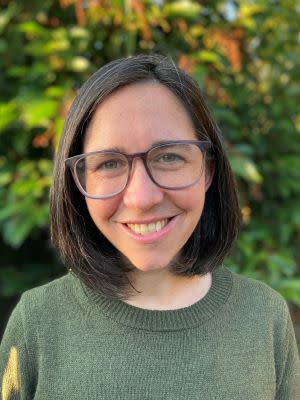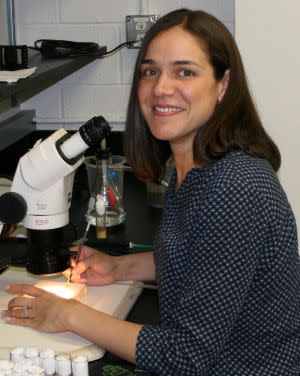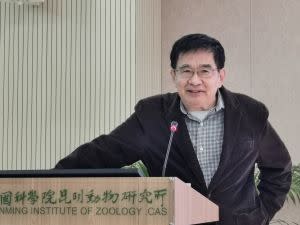SMBE 2025 Faculty Award Winners
SMBE is delighted to announce our 2025 Faculty Award Winners!
Early-Career Excellence Award winner: Alison Feder
 Alison Feder is an Assistant Professor of Genome Sciences at the University of Washington, and an Affiliate Investigator of the Herbold Computational Biology Program at the Fred Hutchinson Cancer Center. The Feder lab studies the rapid evolutionary processes undertaken by the viruses, bacteria and cancerous cells that live within us and cause disease. She earned her B.A. in Mathematics from the University of Pennsylvania, an M.Sc. in Statistics from the University of Oxford and a Ph.D. in Biology from Stanford working with Dmitri Petrov, before becoming a Miller Fellow at UC Berkeley with Oskar Hallatschek. The Feder Lab is currently supported by an NIH Director’s New Innovator Award and grants from the Cystic Fibrosis Foundation.
Alison Feder is an Assistant Professor of Genome Sciences at the University of Washington, and an Affiliate Investigator of the Herbold Computational Biology Program at the Fred Hutchinson Cancer Center. The Feder lab studies the rapid evolutionary processes undertaken by the viruses, bacteria and cancerous cells that live within us and cause disease. She earned her B.A. in Mathematics from the University of Pennsylvania, an M.Sc. in Statistics from the University of Oxford and a Ph.D. in Biology from Stanford working with Dmitri Petrov, before becoming a Miller Fellow at UC Berkeley with Oskar Hallatschek. The Feder Lab is currently supported by an NIH Director’s New Innovator Award and grants from the Cystic Fibrosis Foundation.
Mid-Career Excellence Award winner: Amanda Larracuente

Amanda Larracuente is the Nathaniel and Helen Wisch Professor of Biology at the University of Rochester. She received a BS in Biology from Canisius College in 2003. She received her PhD in Genetics from Cornell University in 2010 working with Dr. Andrew Clark on Drosophila genome evolution, population genetics, and sex chromosome evolution. Amanda's postdoctoral training was at the Whitehead Institute for Biomedical Research with Dr. David Page and the University of Rochester with Dr. Daven Presgraves, where she studied Drosophila evolutionary genetics. She opened her lab at the University of Rochester in 2015. The lab combines functional and evolutionary genomics, cytological, and molecular approaches to study how genetic conflicts shape genome evolution with a focus on genomic repeats in pericentromeres, centromeres, and on sex chromosomes. Her lab's work is currently supported by the National Institutes for Health (NIH) and the National Science Foundation (NSF). Amanda held a Stephen Biggar and Elisabeth Asaro fellowship in Data Science (2017-2020). She advises the undergraduate program in Computational Biology and co-directs an NIH-funded program in Genomic Intensive Data Science Research, Education and Mentorship at the University of Rochester. Amanda served on the Board of Directors for the Genetics Society of America (2022-2024), sits on their education committee, and is an Associate Editor for Molecular Biology and Evolution and for GENETICS.
Lifetime Contribution Award winner: Chung-I Wu
 Chung-I Wu’s research spans a number of topics including meiotic drive, speciation genetics, molecular adaptation, microRNA evolution and, most recently, somatic cell evolution (that includes cancers). During COVID-19, he led a team to study the viral evolution as part of the duties of a scientist citizen.
Chung-I Wu’s research spans a number of topics including meiotic drive, speciation genetics, molecular adaptation, microRNA evolution and, most recently, somatic cell evolution (that includes cancers). During COVID-19, he led a team to study the viral evolution as part of the duties of a scientist citizen.
His main works at the University of Chicago are about speciation genetics and molecular adaptation. He and his associates started the fine-scale genetic analysis of hybrid male sterility in 1990 which culminated in the cloning of the first “speciation genes”, Odysseus, in Drosophila. He is proudest of the fine-scale genetics that shows the massive gene interactions underlying reproductive isolation. It is the genetic interactions that hold the key to understanding speciation. The cloning of the Odysseus gene complements the genetic analyses.
Beyond the genetics of speciation, Wu has made two important conceptual contributions. One is the genetic basis of Haldane’s rule (Wu and Davis 1993) which points out that sexual selection in males may play a larger role than hemizygosity in H-rule. The Wu (2001) article on the genic view of speciation is now a classic, having been cited ~ 1500 times. This view lays the foundation for “speciation with gene flow”.
In 2014, Wu started collaborating with Prof. Suhua Shi on speciation in natural populations, a task uniquely suited to mangrove trees. They identify important biogeographical mechanisms of speciation, in particular, the Mixing-Isolation-Mixing (MIM) mechanism.
In the last 10 years, Wu’s major contribution to evolutionary biology is what they referred to as the ultra-microevolutionary processes, which is the evolution of somatic cells in multi-cellular organisms. Cancer and aging are two manifestation of this process. All these are summarized in the earlier Annual Review of Genetics article (2016) and the two recent eLife papers (Zhang et al. 2024a, b). In these two eLife papers, the potential contributions of evolutionary biology to cancer therapy are clearly laid out.
From 1998 to 2006, Wu served as the chair of the Department of Ecology and Evolution at the University of Chicago where he was a faculty member for 29 years. Between 2008 and 2014, he served as the guest director of Beijing Institute of Genomics (BIG). BIG was effectively a new institute that needs to be built up quickly. It indeed achieved that goal. Since 2008, Wu played a key role in building up the molecular evolution community in China. He leveraged a large cluster grant of 35 million USD to nurture a new generation of young evolutionists in China since 2011.
